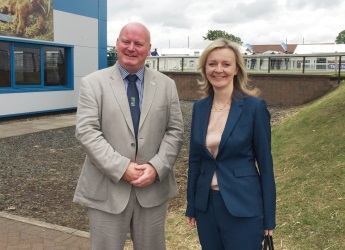£1.3 million in new research could mean a sweeter deal for Scottish berry producers
British berry lovers could get their favourite fruits all year round thanks to three new pioneering UK government funded research projects set to revolutionise Scottish berry production, Environment Secretary Elizabeth Truss said at the Royal Highland Show.
£1.3 million from the government’s £70 million Agri-Tech Catalyst has been awarded to projects led by the James Hutton Institute and James Hutton Limited, to help Scottish producers meet the growing demand for home grown berries.
The projects will use the latest advancements in understanding plant genetics to identify traits in raspberries that make them more resilient to pests and diseases, and in blueberries, traits that are better adapted to growing in Scotland’s cooler climate.
The super-resilient berries could mean a sweeter deal for Scottish growers exhibiting at today’s show by boosting berry yields and extending the UK’s berry growing season, allowing consumers to buy their punnets all year round, and enabling Scottish producers to cash in on the huge demand for blueberries.
 Environment Secretary Elizabeth Truss said: “Scottish berries are up there with Scottish beef and lamb as a top quality UK product and this research will only enhance our reputation for producing good food both here and abroad.
Environment Secretary Elizabeth Truss said: “Scottish berries are up there with Scottish beef and lamb as a top quality UK product and this research will only enhance our reputation for producing good food both here and abroad.
“These projects demonstrate that by investing in the most cutting-edge techniques, and working collaboratively across the UK to raise standards, we can boost productivity and help more Scottish and UK producers to compete in international markets.”
Berries are the latest in a long list of export successes for the UK, with exports trebling from £1.8 million in 2012 to £5.3 million in 2014. A combination of dry summers, fertile soils and better protection has seen strawberry and raspberry production in Scotland double over the past 10 years. In 2014, 25,000 tonnes of strawberries and 3,000 tonnes of raspberries were produced, contributing £81 million to the UK’s growing soft fruit sector, worth an estimated £351 million.
Professor Bob Ferrier, Director of Research Impact at the James Hutton Institute said: “This research is essential for the sustainability and commercial success of the Scottish and UK berry industry. Through the UK government’s investment in applying scientific innovation to address challenges faced across the agri-food supply chain, we can help producers grow more robust, disease resistant soft fruit varieties that are better suited to the UK market and climate.”
The announcement comes during Scotland’s Year of Food and Drink which aims to promote Scotland’s abundant, quality produce and its key role in UK’s food and farming sector. Food and drink exports across the UK were worth nearly £19 billion last year with around 16,000 new food and drink products introduced every year — second in the world only to the US. Since 2014, the UK has opened 130 new markets, contributing to Scotland’s growing food and drink export market valued at £5.8 million. Food and drink remains the UK’s biggest manufacturing sector, with the food chain contributing £103 billion a year to our economy and employing 1 in 8 people.
The Agri-Tech Catalyst – part of the Government’s £160m Agri-Tech Strategy- supports innovative businesses and researchers develop collaborative solutions to global agricultural challenges across the UK. In addition to the £1.3 million government funding, industry has also invested a further £0.7 million in these projects.
Notes to editors:
In 2013, the Government launched the Agri-tech Strategy with £160 million of funding, to be co-invested with industry to address agri-tech challenges.
The Agri-tech Catalyst, established as part of the strategy, bridges the gap between the lab and marketplace by supporting industry-led ‘proof of concept’ development of near-market agricultural innovations.
The Centres for Agricultural Innovation supports the wide scale adoption of innovation and technology, developing skills and capability in the food and farming supply chain.
The Agri-tech Catalyst is run by Innovate UK and the Biotechnology and Biological Sciences Research Council and funded by the Department for Business, Innovation and Skills, the Biotechnology and Biological Sciences Research Council, and the Department for International Development.
To date, 77 Agri-tech Catalyst projects, worth £60m (£40m from the Agri-tech Catalyst and £20m from industry) have been announced. Over 200 companies and research organisations are involved in these projects. Projects funded will address issues such as controlling crop pests, livestock disease, and developing new precision farming technology.
£1.3 million from the government’s £70 million Agri-Tech Catalyst fund have been awarded to projects led by the James Hutton Institute and James Hutton Limited as part of the second and third rounds of funding given in December 2014 and in March 2015.
Further information on successful projects from the previous rounds can be found on the Agri-tech Catalyst’s ‘Previous Competition Results’ section of the Innovate UK website.
Press and media enquiries:
Bernardo Rodriguez-Salcedo, Media Manager, Tel: +44 (0)1224 395089 (direct line), +44 (0)344 928 5428 (switchboard) or +44 (0)7791 193918 (mobile).





